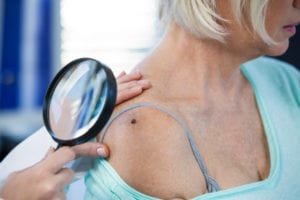What Patients Need to Know about Skin Cancer Recurrence
- Posted on: May 15 2018
Watch Videos About Mohs Surgery Here!
 You don’t have to have experienced a skin cancer diagnosis to worry about the possibility that this disease may manifest at some point. The vast majority of adults today spent their childhood beneath the sun without any protection whatsoever. As awareness was gained about UV exposure and the danger it posed, we began a slow transition into practicing sun safety. Still, the exposure that occurred back then is rearing its ugly head now.
You don’t have to have experienced a skin cancer diagnosis to worry about the possibility that this disease may manifest at some point. The vast majority of adults today spent their childhood beneath the sun without any protection whatsoever. As awareness was gained about UV exposure and the danger it posed, we began a slow transition into practicing sun safety. Still, the exposure that occurred back then is rearing its ugly head now.
Skin cancer diagnoses are at an all-time high. In addition to initial diagnoses, doctors and patients are learning to work together to manage the risk of recurrence and secondary skin cancers. Many patients do ask about their risk of another skin cancer following their first. However, many do not. It is up to dermatologists to create a mindful practice in supporting patients in the area of long-term health.
Are You Wondering About Recurrence?
The first question to keep in mind when discussing the potential for skin cancer recurrence is what type of skin cancer developed initially. There is sufficient data to suggest that patients who have been diagnosed with any type of skin cancer have a higher risk for another. For example, there is a ten-fold chance that Basal Cell Carcinoma or Squamous Cell Carcinoma may recur in the tissue surrounding an initial lesion during the two-year period following initial treatment. Patients diagnosed with melanoma have an increased risk of developing all other types of skin cancer. This is why routine follow-up is vital to lifelong health.
A Word about Basal Cell Carcinomas
Research has indicated that, among other factors, the type of treatment that is performed affects a person’s risk for future BCCs (within a 5-year period after treatment). For example, the recurrence risk is:
- Approximately 10% after surgical excision.
- Just under 8% after electrodesiccation and curettage.
- Approximately 7.5% after cryotherapy.
- Less than 1% after Mohs.
Reducing Risks
The same protocols that reduce risks of primary skin cancers can be implemented to manage long-term health. Patients are encouraged to perform monthly self-exams that observe skin on the entire body. Dermatologists can demonstrate how to maximize the efficacy of the self-exam. A professional skin cancer screening can also provide a baseline and initial demonstration. UV protection is a must and can be procured with a broad-spectrum sunscreen. Approximately two tablespoons of product are necessary to achieve adequate coverage.
Part of our mission is to help patients understand skin cancer and how to protect themselves. Another is to assist dermatologists with practical Mohs training and support. To learn more about our courses, call (800) 616-2767.
Posted in: Skin Cancer


